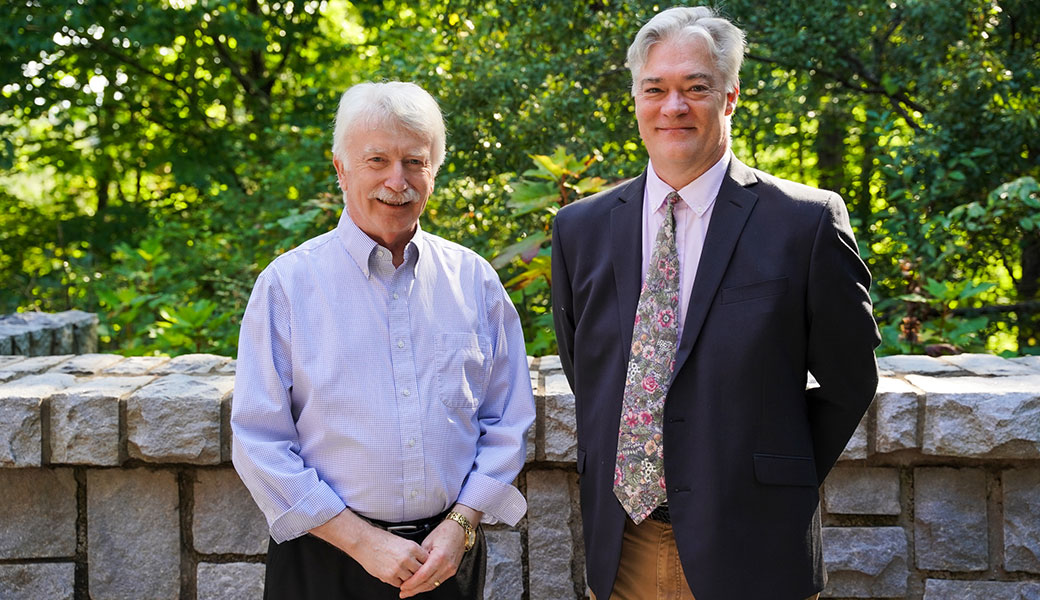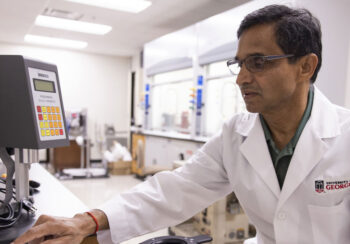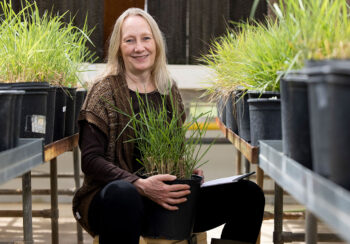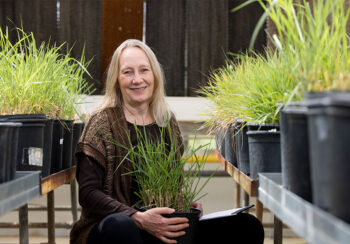During the same summer Al Darvill was co-founding UGA’s Complex Carbohydrate Research Center, Michael Jordan was being voted NBA Rookie of the Year, “New Coke” hit the market, and Mikhail Gorbachev came to power in the Soviet Union.
Thirty-eight years later, CCRC has become one of the world’s leading centers for the study of glycoscience, and Darvill has passed the torch for the organization he helped create. Distinguished Research Professor Michael Tiemeyer, who for three years served as the center’s co-director, became the CCRC’s new director on Jan. 1. Darvill is now part-time director emeritus.
“When [the late Peter Albersheim] and I came here, there was no CCRC—I remember sitting in my office, trying to decide what we were going to call the center,” Darvill recalled. “We came up with CCRC. Some people liked it, others didn’t. But here we are, 38 years later, and it’s still going strong.”
Indeed, CCRC has grown from an initial team of 14 researchers and doctoral students into a vibrant research organization of nearly 300 professionals and students. When it first opened, CCRC operated in rented space on the U.S. Department of Agriculture campus on College Station Road; now it resides in a state-of-the-art, 140,000-square-foot facility on Riverbend Road that boasts some of the country’s most advanced instrumentation for carbohydrate science.
“When we started, the idea was just to get a nucleus of faculty with diverse interests in carbohydrates that could justify the expense of the equipment and the expertise to run it, because carbohydrate science is very equipment-heavy,” Darvill said. “That was the goal—it’s what we dreamed of. So we certainly achieved that and even expanded on it.”
“No other institution or corporate entity in the world,” Tiemeyer said, “possesses the same amount of expertise in glycoscience as can be found at the CCRC.”
That expertise focuses generally on research in three end-application areas: biomedical and other life sciences, biofuels and new materials. The CCRC is the managing unit or is centrally involved in several federally funded centers, some of which have been in operation for decades. And it encompasses a world-renowned Analytical Services and Training unit that shares CCRC’s instrumentation resources with clients around the globe and has taught more than 1,000 scientists in their use.
“That’s what I’m most proud of: the people, the team we’ve put together,” Darvill said. “You can’t build a center on a nice building or nice equipment. You build a center on people, and the building and equipment come later.”
Serving the needs of those people is one of Tiemeyer’s top priorities as CCRC’s leader.
“My hope is to stay the course and meet the needs of our faculty so they can maintain their history of success and trajectory of growth,” he said. “I also want to expand our core audience in glycoscience toward engaging novel, emerging research disciplines that lie just outside our current comfort zone. The CCRC has broad expertise in many biological and biomedical research domains, and we will identify areas ready for growth and recruit the next generation of faculty to help us expand into those domains.”
“Al Darvill’s retirement marks the close of a long and tremendously successful opening chapter in the life of the Complex Carbohydrate Research Center. He and Peter Albersheim envisioned and launched CCRC, and then over nearly four decades turned it into arguably the world’s leading center for the study of glycoscience,” said Karen Burg, vice president for research. “I’m confident that Mike Tiemeyer has the vision and experience to take the baton from Al and manage a seamless transition, as well as bold and energetic step into CCRC’s future.”






